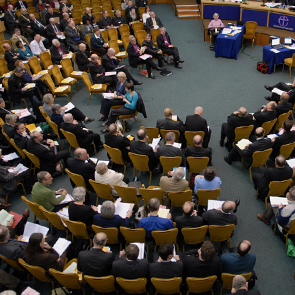Women bishops could be appointed by Christmas, a senior Church of England official said today, as he revealed that an attempt to fast track the legislation would dominate February's General Synod.
In a rare move, Synod will be asked to suspend the standing order that allows dioceses six months to debate the measure, something that has only happened twice in the past 20 years. Instead dioceses will only have three months to consult.
Church of England Secretary General William Fitall told a press conference in London today that "weariness" around the process meant that the Church was keen to capitalise on the enthusiasm Synod had shown for women bishops at its last meeting in November, when it voted overwhelmingly to back a new form of the legislation. Theoretically at least, he said the first woman bishop could be appointed by Christmas.
“Put simply, now that the Steering Committee has identified a package that has commended widespread assent, there is a strong case for getting on and sealing the deal,” the House of Bishops, which has proposed the legislation, said in its report, which will be presented to Synod in February.
Synod will have its final opportunity to revise the legislation, which will appear almost exactly as worded in November, over the course of one full day in the February session. It will also be asked to repeal the canon that currently prevents women becoming bishops and to suspend the standing order that allows extensive debate on a diocesan level.
The House of Bishops argued that dioceses had already had extensive opportunity to debate the legislation when it was rejected in a previous form last year, and said that the new package had “overwhelming” support in the Synod.
But Mr Fitall said that were concerns that the upcoming debate, which will take up an entire day of the three-day session in London in February, could be hijacked. A further change in process will mean that every proposed amendment must be debated by Synod, which could leave the process open to filibuster, he acknowledged.
"It would be unwise to be confident," he said. "Synod is unpredictable. There are no whips, no discipline."
But he added that there was "a lot of hope" that Synod would back the legislation.
If Synod finishes its revision and passes the legislation in February it will be proposed for final consent when Synod next meets in July. Provided it is then backed in Parliament and receives Royal Assent, Synod could promulgate the canon, the point at which it becomes law, when it meets in November.




 Loading ...
Loading ...